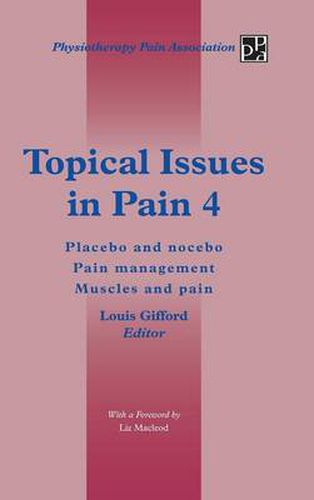Readings Newsletter
Become a Readings Member to make your shopping experience even easier.
Sign in or sign up for free!
You’re not far away from qualifying for FREE standard shipping within Australia
You’ve qualified for FREE standard shipping within Australia
The cart is loading…






This title is printed to order. This book may have been self-published. If so, we cannot guarantee the quality of the content. In the main most books will have gone through the editing process however some may not. We therefore suggest that you be aware of this before ordering this book. If in doubt check either the author or publisher’s details as we are unable to accept any returns unless they are faulty. Please contact us if you have any questions.
This fourth volume contains further ground-breaking and highly relevant work. Taking on the placebo and nocebo phenomenon, pain management and muscles and pain the volume yet again promotes the forward thinking and cutting edge work of the Physiotherapy Pain Association. In Part 1 a number of internationally renowned clinicians and researchers have come together to produce the first published attempt to broadly address and critically appraise the placebo and nocebo phenomenon from a clinical perspective for physiotherapists. The information and the way the material is presented should fascinate as well as challenge readers to think and work differently. Understanding the placebo fully requires a radical shift in thinking about human recovery mechanisms and the way in which treatments can be triggered to work at their most efficient. Part 2 takes on three more pain management topics - the integration of pain management approaches and techniques for individual therapists working with individual patients or in ‘out-patient’ settings; information giving for patients and addressing the taxing problem of improving fitness in patients with chronic pain related incapacity. The last part is devoted to some major issues surrounding the relationship of muscles to pain. Many current beliefs about the role of muscles come under scrutiny and some are constructively challenged by new proposals. Perhaps the most exciting aspect of the work presented here is that physiotherapy, if it fully integrates the information provided into clinical practice, should be increasingly recognised as the central and essential component of modern management of musculoskeletal pain states. The Topical Issues in Pain series derives from the work, study days and seminars of the Physiotherapy Pain Association and is written by clinicians for clinicians. Each volume reviews the literature and presents best practice in a lively and understandable text. All clinicians will benefit from the straightforward advice.
$9.00 standard shipping within Australia
FREE standard shipping within Australia for orders over $100.00
Express & International shipping calculated at checkout
This title is printed to order. This book may have been self-published. If so, we cannot guarantee the quality of the content. In the main most books will have gone through the editing process however some may not. We therefore suggest that you be aware of this before ordering this book. If in doubt check either the author or publisher’s details as we are unable to accept any returns unless they are faulty. Please contact us if you have any questions.
This fourth volume contains further ground-breaking and highly relevant work. Taking on the placebo and nocebo phenomenon, pain management and muscles and pain the volume yet again promotes the forward thinking and cutting edge work of the Physiotherapy Pain Association. In Part 1 a number of internationally renowned clinicians and researchers have come together to produce the first published attempt to broadly address and critically appraise the placebo and nocebo phenomenon from a clinical perspective for physiotherapists. The information and the way the material is presented should fascinate as well as challenge readers to think and work differently. Understanding the placebo fully requires a radical shift in thinking about human recovery mechanisms and the way in which treatments can be triggered to work at their most efficient. Part 2 takes on three more pain management topics - the integration of pain management approaches and techniques for individual therapists working with individual patients or in ‘out-patient’ settings; information giving for patients and addressing the taxing problem of improving fitness in patients with chronic pain related incapacity. The last part is devoted to some major issues surrounding the relationship of muscles to pain. Many current beliefs about the role of muscles come under scrutiny and some are constructively challenged by new proposals. Perhaps the most exciting aspect of the work presented here is that physiotherapy, if it fully integrates the information provided into clinical practice, should be increasingly recognised as the central and essential component of modern management of musculoskeletal pain states. The Topical Issues in Pain series derives from the work, study days and seminars of the Physiotherapy Pain Association and is written by clinicians for clinicians. Each volume reviews the literature and presents best practice in a lively and understandable text. All clinicians will benefit from the straightforward advice.